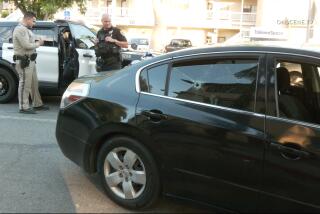OCTA’s 91 Toll-Lane Deal in Trouble
- Share via
Legislation that would allow the Orange County Transportation Authority to buy the privately owned 91 Express Lanes was in jeopardy Wednesday after two key legislators pulled their support.
The bill would allow OCTA to take over 10 miles of toll lanes in the center of the Riverside Freeway between Anaheim Hills and Corona. The sale would remove a state ban on improvements to the congested road, which serves as the main commuter artery between Orange and Riverside counties. Officials said the sale would ultimately ease traffic in one of Southern California’s most intense commuting corridors.
Passing the bill this session is considered crucial because the toll road’s owner has said it will pull out of the sale if legislation isn’t passed this year.
Time is running out as lawmakers scramble to meet Saturday’s deadline to pass this year’s bills.
Senate Minority Leader Jim Brulte (R-Rancho Cucamonga) said he cannot support the legislation because an amendment he wanted did not make it into the final bill.
Brulte insisted that the bill require Riverside County to spend $500 million--as it has promised--for improvements to the freeway. Riverside County officials successfully fought Brulte’s changes, saying a mandate would usurp local control over the money.
“I understand the desire for local control, but I’m the one being asked to vote for this,” Brulte said Wednesday from the Senate floor. “What if I voted for this and 15 years from now, none of the improvements have been made?”
Assemblyman John Campbell (R-Irvine) announced late Wednesday that he would oppose the bill because language he wanted requiring that OCTA fund Riverside Freeway improvements was also rejected.
The bill’s author, Assemblyman Lou Correa (D-Anaheim), said he still hopes the bill will get through. It was approved Wednesday by the Senate Appropriations Committee, and Correa hopes it will be voted on today in the full Senate. The bill also must be approved by the Assembly before being sent to Gov. Gray Davis for his signature.
Correa said he was disappointed at Wednesday’s developments. “Clearly, not having Brulte on the bill is not good news,” Correa said. “We’ll keep working.”
Mike Ward, an OCTA board member from Irvine, shared Correa’s frustration.
“I always thought that if the thing got messed up, it would get messed up by politics in Sacramento,” Ward said. “If that happens, people sitting in their car on the freeway need to be reminded who did this to them.”
The bill, introduced just two weeks ago, faced hurdles from the start. Many Democrats in Sacramento are philosophically opposed to toll roads, including Davis, who announced in March that “as long as I’m governor, freeways are staying free.”
Some Democratic legislators called it unfair for inland commuters who work in Orange County but can’t afford to live there to be forced to pay tolls for an easier drive to work. Critics also argue that the toll lanes, which opened in 1996, contributed to the traffic on the Riverside Freeway because the state promised not to make improvements to the road that would coax cars off the toll lanes.
Correa hoped that high-powered support from a united coalition of Democrats and Republicans from Orange and Riverside counties would overcome the critics. The Riverside Freeway is among the most congested in Southern California, handling more than 250,000 vehicles a day.
OCTA earlier this year offered to pay the California Private Transportation Co. $207.5 million for the lanes, which were built for about $135 million. The public agency would continue to charge tolls until the lanes were paid off.
“We went through great pains to get to a [sales price],” OCTA spokesman George Urch said. If the bill fails to win approval, the agency would have to go through purchase negotiations again “and it would be a challenge.”
“In the next 20 years, Orange County’s population is expected to grow by 600,000 people [and] west Riverside County will double in size,” Urch said. “We’ve got to do something with the 91 ....If this [legislation] doesn’t pass, at least we know we did our best to help the people who use this road.”
More to Read
Sign up for Essential California
The most important California stories and recommendations in your inbox every morning.
You may occasionally receive promotional content from the Los Angeles Times.










